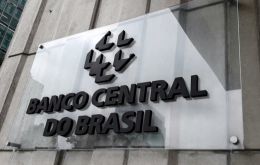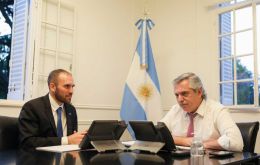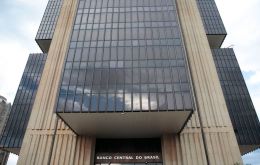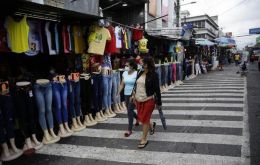MercoPress. South Atlantic News Agency
Tag: Inflation
-
Friday, February 12th 2021 - 09:18 UTC
Brazil congress passes bill granting the central bank greater autonomy

Brazil's lower house of Congress on Wednesday approved the text of a bill granting the central bank autonomy, which will set fixed four-year terms for the bank's president and directors, and tighter rules on their exit from office.
-
Thursday, February 11th 2021 - 08:47 UTC
Brazilian Central Bank says inflation outlook rose for the fifth week running

Brazil's central bank weekly FOCUS survey of some 100 economists and financial institutions indicated that the outlook for inflation in the country rose for the fifth consecutive week, and is getting closer to the bank's target for the year.
-
Tuesday, February 9th 2021 - 09:43 UTC
Fernandez expects IMF to grant Argentina more flexible repayment terms

President Alberto Fernández believes the International Monetary Fund (IMF) should grant Argentina more “flexible” terms on the repayment terms of the debt and warned that increasing inflation could lead his government to again hike export taxes, the president said in an interview on Sunday with newspaper Página/12.
-
Saturday, January 30th 2021 - 09:55 UTC
Official 2020 inflation in Argentina at 36,1%, but several points higher for the poor half of the country

Argentina registered inflation of 36,1% in 2020, with the declining rate during three quarters, picking up strongly in the last three months particularly basics such as food which is serious since almost half of the Argentine population are cataloged as poor or living below the poverty line.
-
Thursday, January 28th 2021 - 09:37 UTC
Argentine traders and millers discussing options to avoid a ban on wheat exports

Argentina is worried about domestic food prices and inflation, and as it happened a few weeks ago with an attempt to ban corn exports, a similar situation apparently is happening with wheat, and the different actors involved are working on measures aimed at securing the wheat supply and reasonable bread and pasta prices.
-
Wednesday, January 13th 2021 - 09:14 UTC
Brazilian interest rates in the next 24 months expected to rise steadily

The outlook for Brazilian interest rates over the next two years rose to their highest in several months, a central bank survey of economists showed on Monday, even as exchange rate and inflation expectations held steady.
-
Wednesday, January 13th 2021 - 09:11 UTC
Brazilian 2020 inflation 4,5%, but food prices skyrocketed 14,1%

Inflation in Brazil ended 2020 at 4,5% the stats agency IBGE revealed on Tuesday, above the central bank's target, with food prices rising, 14,1%, the most in two decades.
-
Saturday, January 9th 2021 - 09:59 UTC
Argentine economy forecasted to expand 5,5% this year, but inflation will remain close to 50%

Argentina's economy is expected to grow 5,5% in 2021, after a contraction of about 12% last year due to the COVID-19 pandemic, with inflation seen ending the year at 49.8%, according to a survey of economists by the central bank released on Friday.
-
Thursday, December 31st 2020 - 08:30 UTC
Argentina suspends corn export sales until March; farmers' surprised and furious

Argentina will suspend sales of corn for export until Feb. 28, the agriculture ministry said on Wednesday, announcing the surprise move as part of the government's effort to ensure ample domestic food supplies.
-
Thursday, December 10th 2020 - 09:11 UTC
Brazil central bank keeps interest rate at record low 2%, but admits scenario of inflation expectations

Brazil’s central bank kept its key interest rate at a record low 2.00% on Wednesday, as expected, but gave the first sign it could soon drop its pledge to keep rates lower for longer as inflation expectations converge toward target.
